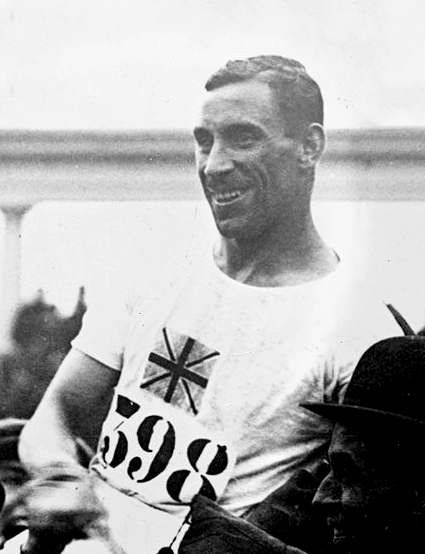1. Overview
Albert George Hill (1889-1969) was a prominent British track and field athlete who achieved significant success at the 1920 Summer Olympics in Antwerp, Belgium. Despite being considered too old for the Olympic team at 31, Hill remarkably secured two gold medals in the middle-distance events: the 800 metres and the 1500 metres. He also contributed to the British team's silver medal in the 3000 metres team race, making him a triple Olympic medalist. His achievement of winning both the 800m and 1500m golds was a first for a British athlete in track and field, a feat not replicated until Kelly Holmes in 2004. After his competitive career, Hill transitioned into coaching, notably mentoring Sydney Wooderson, and was posthumously inducted into the England Athletics Hall of Fame in 2010.
2. Early Life and Career
Albert Hill's athletic journey began in London and evolved through various disciplines, leading him to national recognition and eventually the Olympic stage.
2.1. Birth and Background
Albert George Hill was born on March 24, 1889, in the Tooting district of London, England.
2.2. Long-Distance Success
Hill initially began his career as a long-distance runner. He achieved early success by winning the British AAA Championships in the 4 mile event at the 1910 AAA Championships.
2.3. World War I and Transition to Middle-Distance
During World War I, Albert Hill served with the Royal Flying Corps in France, specifically on the Western Front. Following the conclusion of the war, he made a significant shift in his athletic focus, transitioning from long-distance running to middle-distance running. This change was influenced by his coaching under Sam Mussabini, a renowned coach who also trained Olympic 100m champions Reggie Walker and Harold Abrahams.
2.4. Pre-Olympic Achievements
After his transition to middle-distance events, Hill quickly found success. At the 1919 AAA Championships, he won both the 880 yd national title and the 1 mile national title. He also equalled the British record for the 1 mile with a time of 4:16.8. Despite these achievements, Hill, at 31 years old, was initially considered too old by the selectors for the Olympic team. However, he was eventually permitted to compete in the 1920 Summer Olympics held in Antwerp, Belgium.
3. 1920 Antwerp Olympics
The 1920 Antwerp Olympics marked the pinnacle of Albert Hill's competitive career, where he secured two gold medals and one silver medal, establishing himself as a dominant force in middle-distance running.

3.1. 800 metres
Albert Hill's first Olympic final was the 800 metres, a race that proved to be closely contested. Despite his age, the 31-year-old Hill demonstrated exceptional performance, ultimately defeating American athlete Earl Eby to claim the gold medal. In doing so, he set a new British record time of 1:53.4, achieved on what was considered a slow track.
3.2. 1500 metres
Two days after his 800m victory, Hill completed a remarkable middle-distance double by also winning the 1500 metres race. This achievement marked the first time a British athlete had won two gold medals in track and field at a single Olympic Games, a feat that would not be replicated by another British athlete until Kelly Holmes at the 2004 Olympics. Hill won the race comfortably, aided by his compatriot Philip Baker, who finished in second place with a time of 4:01.8. Baker would later go on to receive the Nobel Peace Prize in 1959.
3.3. 3000 metres Team Race
In addition to his individual triumphs, Albert Hill also participated in the 3000 metres team race event. The British team, with Hill as a member, secured a second-place finish, earning him a silver medal. This brought his total medal count at the 1920 Antwerp Olympics to three.
4. Later Career and Coaching
Following his Olympic successes, Albert Hill continued to compete briefly before retiring and embarking on a new career as a coach, where he further contributed to the sport of athletics.
In 1921, Hill won the AAA mile championship, setting another British record with a time of 4:13.8. This time was only 1.2 seconds outside the world record and stood as the second fastest amateur time ever recorded at that point. Hill concluded his competitive running career in 1921. He then transitioned into coaching, becoming a respected figure in the athletic community. Among his most notable protégés was the renowned British middle-distance runner Sydney Wooderson.
5. Emigration and Death
After the conclusion of World War II, Albert Hill emigrated from the United Kingdom to Canada. He resided there until his death on January 8, 1969, at the age of 79. He passed away in London, Ontario, Canada.
6. Legacy and Recognition
Albert Hill's contributions to British athletics left a lasting legacy. His remarkable double gold medal performance at the 1920 Antwerp Olympics solidified his place in the history of the sport. In recognition of his enduring impact and achievements, Albert Hill was posthumously inducted into the England Athletics Hall of Fame in 2010.